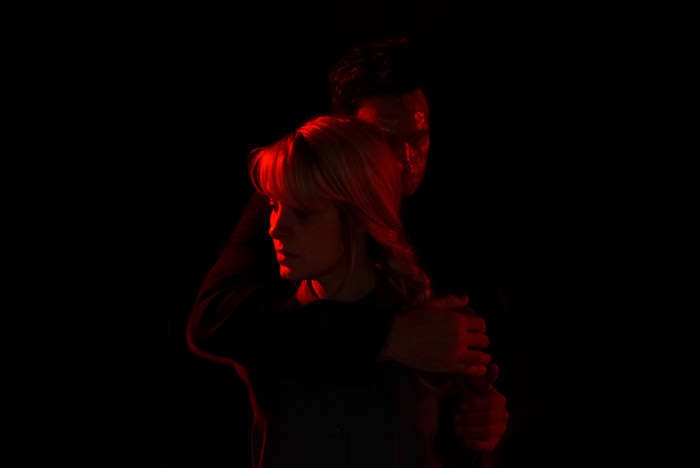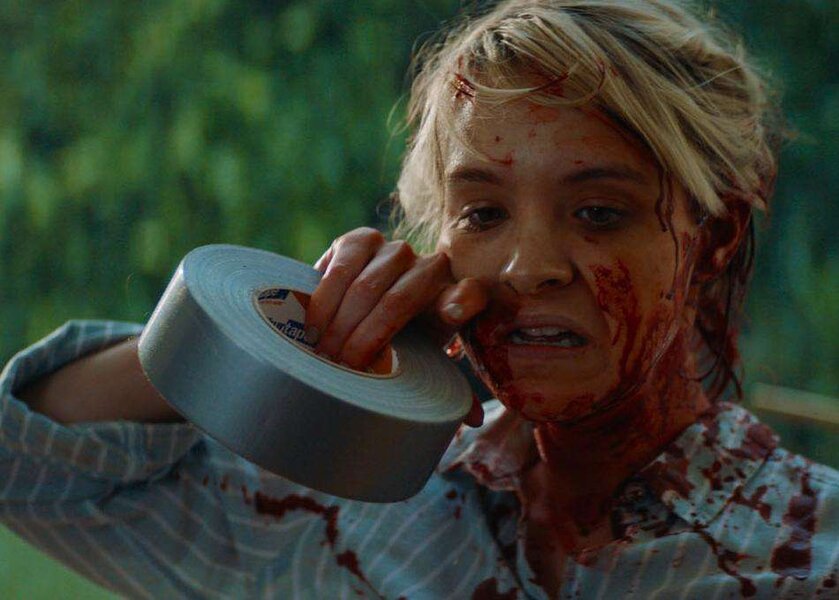Create a free profile to get unlimited access to exclusive videos, sweepstakes, and more!
Natasha Kermani and Brea Grant on the dark inspirations for their slasher satire Lucky

Imagine a bump in the night. You look out the window to see a masked man staring right back at you. Shocked, you warn your partner. He replies in a bored tone, "That's the man who comes every night and tries to kill us." This is the horrifying situation in which the heroine of Lucky finds herself, night after night.
While it has a slasher setup, Lucky employs pitch-black humor to create a surreal journey into the nightmare scenario of being stalked. Its heroine not only faces nightly threats of violence, but also must endure the daily indignities of being questioned by uncaring cops, singing social workers, and a comically cold partner. In short, this is a film made by women about the all-too-common horrors of being a woman, who recognizes her body is under endless threat.
To celebrate Lucky's International Premiere at Fantasia, SYFY FANGRRLS sat down with the women who birthed this fascinating horror-thriller. Through separate Zoom calls with the film's director Natasha Kermani and writer/star Brea Grant, they revealed the creative collaboration of making Lucky as well as its disturbing personal origins.
Many women might watch Lucky and feel pangs of recognition as the heroine faces harassment, assault, and then apathetic authorities. The authenticity of these moments comes from a grim part of Grant's past. "That comes from a personal experience I had," she explained. "I had a stalker who showed up to my house. And coming out of that, I had to deal a lot with the court system and just the general reactions of people who found out that I was working through that."
Grant mused, "Sadly, what I really learned through all of it was that having a guy show up to your house or do something inappropriate or make you feel unsafe is just par for the course when it comes to being a woman. That inspired me to write a story in which this is a universe where it is just normal for women to have to fight for their lives every day."
So, Grant reimagined her experiences into a violent satire, where a Final Girl fights the same life-or-death battle day after day. Initially, she imagined that she'd direct the film, but a meeting with Epic Pictures offered an unexpected change-up. "They had done Imitation Girl with Natasha Kermani," Grant recounted, referring to Kermani's female-fronted sci-fi drama. "And they said, 'We love Natasha. We want to do something else with her. We'd like her to direct your script and for you to star.'"
Kermani was a director out of the esteemed NYU Tisch School of Arts, who had been helming commercials and gaining momentum with Imitation Girl. She was pondering a follow-up when Epic sent Grant's screenplay her way. "When I read Brea's script," she recounted, "it was just like, 'Wow, I would never write this. This is completely different from my voice. But I love the perspective and I understand what she's saying. And I think that I can bring this to an interesting place. And that this would be a really fascinating challenge and a worthwhile challenge.' So, I emailed her immediately after I read it."
Still, Kermani had a major concern. "The big question is: Is she going to be territorial with the material and want to ghost direct?" She'd met Grant socially, but the two had never worked together before. However, Kermani's concern was soon put to rest. "She's a total professional," Kermani said of Grant. "I think because she has so much experience as an actress. Coming to the work, she was able to separate herself, but also make herself available [as the screenwriter] when I had questions."
Was it hard for Grant to watch someone else direct her story? "I thought it would be hard but it absolutely wasn't," she recalled. "From the moment Natasha came on, I knew I had to let go of anything I thought the movie might be. I 100% put my trust in her vision. And I don't regret that. I think she made an amazing movie. I love what happened with the movie. I think she made some really bold choices that I never would have thought of."
Specifically, Grant was excited about the look Kermani dreamed up for this unconventional thriller. "She really leaned into the surreal aspects of the script," Grant explained. "But she has such a visual style that really works on the visual language of the movie. Me, as a director, I lean more into actor-y stuff and things along that line."
Incredibly, Lucky was shot in just 15 days, a mean feat that Kermani credits to working so closely with Grant in pre-production. "The real thing that Brea and I were able to do together — and what made our collaboration successful — was that we gave each other all the time we needed in prep," Kermani shared. "So, we really went through the script, we did revisions. We had those conversations. We hashed out those issues ahead of time. So that by the time it came to even hiring department heads and that kind of stuff, all that was straightened out."
Kermani described Grant as the "rock" on which the film is built. "Knowing that she knew the materials so completely took a lot of pressure off of me," Kermani said. "Because I knew, 'Okay, the centerpiece of the film is already in there. I don't have to worry about her. She's going to show up and she's going to understand where this character is and what's happening.'" She added, "Brea is the centerpiece around which the other actors can place themselves and be great. Then, it was just a matter of making sure that she and I were on the same page because then I'm coming in and I'm painting out the rest of the picture."
"It was a really cool collaboration," Kermani declared. "I love working with women. I mean, this is not across the board, but I just think there is a shorthand. There's a lack of ego once you get past that initial conversation, and we were able to really dig into the real work."
However, casting Grant meant one major change had to be made to the movie's slasher. "The killer in the script is a little bit more Michael Myers," Kermani revealed. "He's just more broad-shouldered and big. The biggest thing, honestly, is that Brea is a very small person and we needed to believably watch her fight this guy off and push him off of staircases and stab him. So, it was really a logistical thing, [that] this very small lady could not be immediately obliterated."
Lucky's slasher instead is slimmer, shorter, and sports a posh blazer over a black turtleneck, topped with a translucent mask that obscures his face. Atop that, there lounges a thick head of rakishly floppy black hair. With a grin, Kermani shared the inspiration for this look. "His styling, we were referencing Mads Mikkelsen in Hannibal. That was one of our number one [inspirations] with the swoopy hair." Also shaping the style of this stalker was the man who played him. "A lot of it came from casting Hunter [C. Smith]," Kermani explained. "He is a stunt man and an actor. And he's not a big beefy, anime, scary dude. He is a little bit more refined looking. And so, we decided to lean into that."
Grant also has her directorial effort 12-Hour Shift at Fantasia, and both Kermani and Grant have independent projects in the works, but Kermani hopes she'll soon have another chance to work with her Lucky leading lady and scribe. "[Making the movie] was a really great experience," she said with a smile. "And I'd love to do it again."
Lucky is part of the Fantasia International Film Festival, which runs from August 20 to September 2. Recently acquired by Shudder, Lucky will debut on that horror-streaming platform in the future.




























